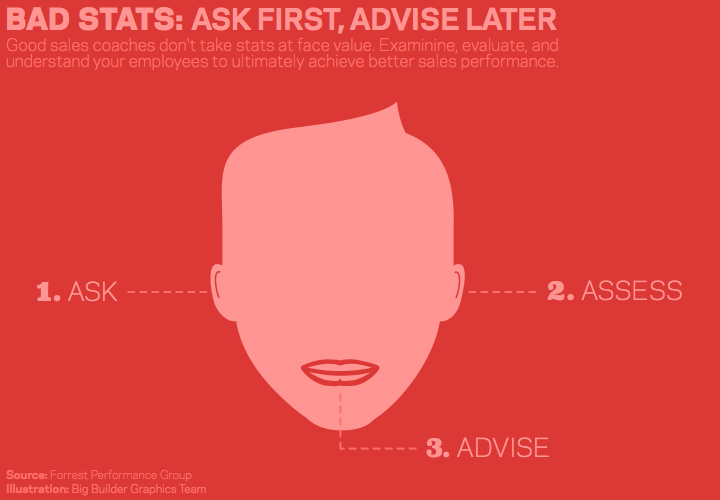If a doctor prescribed medications after a mere glance at a patient’s chart, she’d get sued for malpractice. It’s understood that the chart doesn’t have all the information she needs and that a good doctor advises patients and prescribes medicine or gives advice only after attempting to get the complete story. Just as looking at a patient’s chart doesn’t provide enough information to a doctor, looking at a salesperson’s stats doesn’t provide a complete picture to sales coaches. There are simply too many factors that can contribute to a salesperson’s performance to address each sales pro the same way.
Coaches who react to the numbers without getting a complete assessment of the situation are no different than the doctor who prescribes medication without first examining the patient (a lawsuit waiting to happen). While you may not get sued, you’re also unlikely to provide the best solutions for your client’s situation, which means your department and company also suffer. As a coach, it’s your job to lead each person in your department to become the best version of themselves, which contributes to individual, departmental, and company-wide success.
In order to provide advice and lead a patient in the healthiest and most constructive direction, a doctor may ask questions about her patients’ activity level, family history, and habits. Like the doctor, it’s a sales coach’s job to assess the situation first and then to offer solutions. Too often, though, managers provide a prescription before fully assessing the situation. In order to assess the situation, look for trigger words that tell you there’s more information to discover. For example, when sales professionals use absolutes like, “No one can qualify,” the coach needs to step in and hold them accountable by asking questions to find out why. Watch for tip-offs, words like everyone, all, and nobody. When you hear these absolutes, ask additional questions, such as, “What questions are you currently asking to find out if the customer is financially able to buy a home?” Keep digging by asking what their feedback is, whether customers seem excited, etc. Other questions to help sales coaches assess the current situation include, “What are you currently working on? What’s working for you? What’s the process you’re currently using?
By uncovering a salesperson’s current behaviors and beliefs, coaches will often discover what is really going on, and they’ll know what to do next. Once you’ve assessed the situation, you can present a solution (outcome). For instance, in the example above, the sales coach may discover that the desired outcome is to get the prospect to do a pre-qualification or just to be excited to find out how much they can afford. This “outcome” is like a prescription—something to improve the salesperson’s “health” and increase sales.
So before you advise, ask. Everyone’s health depends on it.

Jason Forrest: Culture coach tips.



